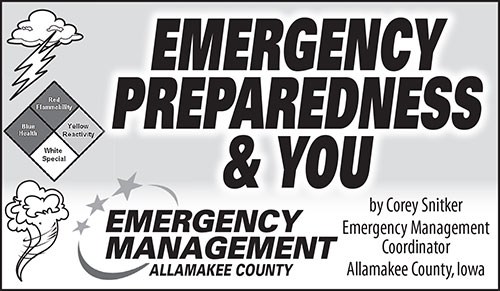You are here
Home ›Winter Weather Awareness Day

Hi, and Happy Winter Weather Awareness Day for Thursday, November 9!
A couple of weeks ago would have seemed too early, but given the weather the last couple of weeks, that greeting seems to fit as we are fast becoming aware of the upcoming winter season that will soon be upon us. So, in recognition of this day, I would like to discuss some things we can start looking at as we prepare for our upcoming Iowa weather.
One of the first things we should do is make sure we are aware of the hazards we face during the winter season and this, of course, includes snow, ice and cold. Each one brings unique features and dangers with it, along with their own impact on our safety during the winter months. However, with so much to cover with these alone, I will discuss these hazards in my upcoming December article and will use this article to focus on the following simple preparation activities we can take at this time.
Once we know our hazards, we need to prepare, and a key feature of this preparedness is weather awareness and knowing the upcoming forecast is paramount to being ready ahead of time for any of these potential risks. This allows us to dress for the weather and to also plan our activities knowing the weather’s potential impact on our normal daily routines, extracurricular activities and any future planning we may do.
The National Weather Service in La Crosse website, http://www.weather.gov/arx/, provides winter weather information for the surrounding area; we should also listen to and watch our local radio and TV stations and can follow the weather on our cell phones. The following NWS La Crosse website also provides the ability to link to forecasts for other areas and road conditions at http://www.weather.gov/arx/winter_monitor and has links to the Department of Transportation (DOT) sites in Iowa, Minnesota, Wisconsin and Illinois.
This is especially important if you are driving a long distance and should include checking the DOT sites for road conditions along the entire route you are driving. This can be found at https://www.511ia.org/ for Iowa. Also, please let someone know when you plan to travel and the route you plan to take and a timeline, so that if you do get stranded, someone is aware of your plans and can report this information to local emergency responders if you become overdue, especially if you are traveling in remote areas.
Additionally, being a very mobile society, having a winter survival kit in our vehicles is essential and this kit can include the following items: Jumper cables; flares or reflective triangle are great extras; Flashlights: replace the batteries before the winter season starts and pack some extras; First Aid Kit: also check your purse or bag for essential medications; Baby, special needs gear: if you have a baby or family member with special needs, pack diapers and any special formula or food; Food: stock non-perishable food, such as canned food and a can opener, dry cereal and protein-rich foods like nuts and energy bars; Water: have at least one gallon of water per person a day for at least three days; Basic toolkit: pliers, wrench, screwdriver; Pet supplies: food and water; Radio: battery or hand-cranked; Cat litter or sand: for better tire traction; Shovel: to dig out snow; Ice scraper: even if you usually park in a garage, have one in the car; Clothes: make sure you dress for the weather in warm clothes, gloves, hat, sturdy boots, jacket and an extra change of clothes for the cold; Warmers: pack extra for body, hand and feet; Blankets or sleeping bags: if you get stranded in traffic on a lonely road, you'll be glad to have it; and finally, a charged cell phone: keep a spare charger in your car as well.
Finally, a quick note on chimney safety, especially for those who use wood for burning inside the house. Please ensure to have your chimney inspected and cleaned, if needed, to avoid fires or carbon monoxide poisoning.
Thanks and be prepared and be safe. Information for this article was collected from the National Weather Service website.

